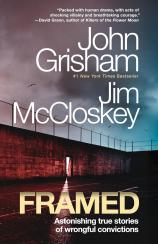Framed: Astonishing True Stories of Wrongful Convictions
Review
Framed: Astonishing True Stories of Wrongful Convictions
If you read FRAMED, prepare yourself to get truly angry. John Grisham and Jim McCloskey have come together to produce this astonishing and frustrating look at America’s legal system from two widely divergent paths.
Grisham is the author of countless bestsellers and a two-time winner of the Harper Lee Prize for Legal Fiction. While he certainly could have rested on those laurels, he is active in the Innocence Project and Centurion Ministries. Much of his writing examines problems with the legal system, and he often speaks publicly about these matters.
Jim McCloskey is the founder of Centurion Ministries, the first organization dedicated to exonerating innocent people who have been wrongly convicted. They have freed 70 people serving life sentences or awaiting execution for crimes they did not commit. McCloskey wrote about his work in his 2020 memoir, WHEN TRUTH IS ALL YOU HAVE.
"I know that most people in the legal system are hard-working, conscientious believers in justice. But far too often we are silent about injustices that must be recognized and corrected. Hopefully, after reading John Grisham and Jim McCloskey’s eye-opening book, we will be silent no longer."
Ever since Grisham penned THE INNOCENT MAN, which was published in 2006 and revolved around a wrongful conviction in Oklahoma, he has wanted to shine a stronger light on these cases: “From a pure storytelling perspective, they are incredible because the drama has so many layers.” McCloskey writes from a far more personal standpoint, and his experiences have been heartbreaking.
Grisham and McCloskey each recount five cases in FRAMED, the goal of which is to raise awareness of wrongful convictions and in some small way help to prevent more of them from occurring. It strives to expose and document some of the abusive tactics used by law enforcement, prosecutors, expert witnesses and judges to convict innocent people.
These 10 cases include 21 charged individuals, although in several instances others were arrested and then released. Four of these people were sentenced to death, and two came within days of execution. One case found an innocent person executed, which happens all too often in America. Since the death penalty was reimposed in 1973, hundreds of individuals sentenced to death were later exonerated. On occasion, even exoneration comes too late. On September 24th of this year, Missouri executed Marcellus Williams, who was convicted of murder despite prosecutors and other officials believing he was innocent.
As FRAMED points out quite clearly, wrongful convictions share many points of similarity. Brutal murders, often involving youthful victims, receive heavy publicity. Investigating departments, some of which are understaffed and inexperienced, are under enormous pressure to solve the crime quickly. They often resort to tactics that are later discredited or simply illegal. Prosecutors then present so-called experts relying on junk science that courts accept as reliable. Defendants charged with crimes often lack the resources and competent attorneys to defend themselves. Even jurors, the last wall against weak factual cases, feel the community pressure to do the correct thing. They are assisted by prosecutors who use a conviction in a high-profile case as a political stepping stone.
Sadly, when evidence of a wrongful conviction becomes public, those who contributed to obtaining the tainted verdict go unpunished. Grisham and McCloskey share at least one example in which some of the wrongdoers find themselves on the other side of the legal system facing punishment.
I came to this book after decades of work in the criminal justice system as a prosecutor, judge and defense attorney. My journey regarding the death penalty began in the 1970s when I appeared before the Illinois Supreme Court arguing in support of a death sentence. It ended in 2011 when my state elected to abolish the death penalty, a decision that I welcomed. By then, Illinois had experienced more wrongful convictions than it had executions. We learned that the death penalty road had far too many land mines on the path to a fair and just result in capital cases.
Perhaps that is why FRAMED struck a chord with me. I know that most people in the legal system are hard-working, conscientious believers in justice. But far too often we are silent about injustices that must be recognized and corrected. Hopefully, after reading John Grisham and Jim McCloskey’s eye-opening book, we will be silent no longer. The system needs our help.
Reviewed by Stuart Shiffman on October 18, 2024
Framed: Astonishing True Stories of Wrongful Convictions
- Publication Date: August 26, 2025
- Genres: Nonfiction, True Crime
- Paperback: 368 pages
- Publisher: Vintage
- ISBN-10: 059368723X
- ISBN-13: 9780593687239





